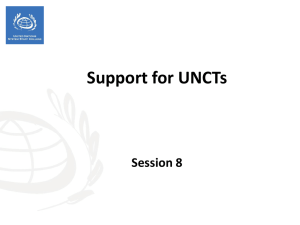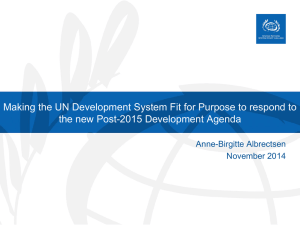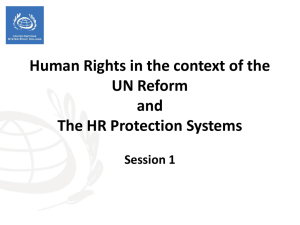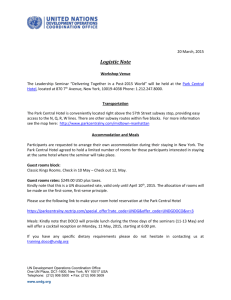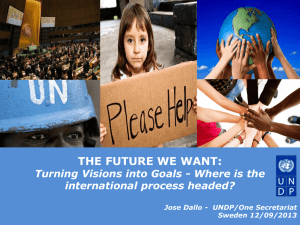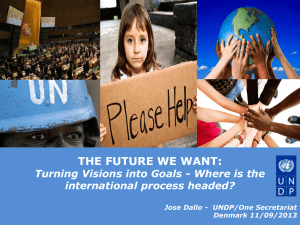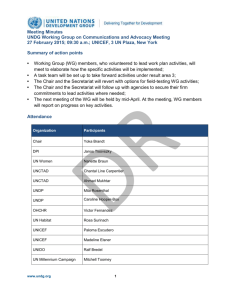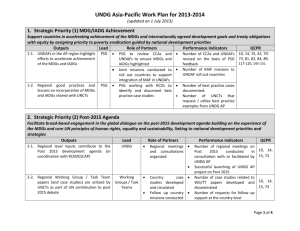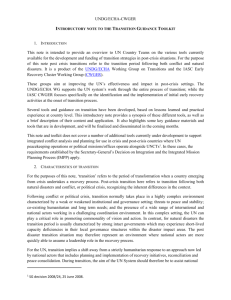Funding proposal UNDG
advertisement
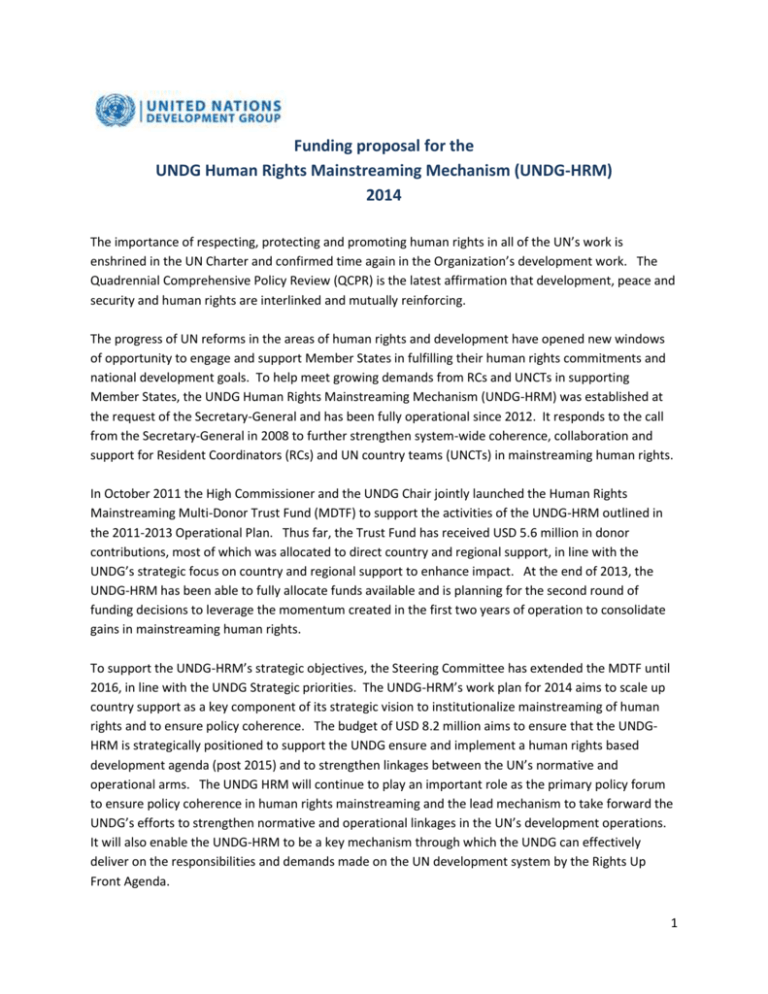
Funding proposal for the UNDG Human Rights Mainstreaming Mechanism (UNDG-HRM) 2014 The importance of respecting, protecting and promoting human rights in all of the UN’s work is enshrined in the UN Charter and confirmed time again in the Organization’s development work. The Quadrennial Comprehensive Policy Review (QCPR) is the latest affirmation that development, peace and security and human rights are interlinked and mutually reinforcing. The progress of UN reforms in the areas of human rights and development have opened new windows of opportunity to engage and support Member States in fulfilling their human rights commitments and national development goals. To help meet growing demands from RCs and UNCTs in supporting Member States, the UNDG Human Rights Mainstreaming Mechanism (UNDG-HRM) was established at the request of the Secretary-General and has been fully operational since 2012. It responds to the call from the Secretary-General in 2008 to further strengthen system-wide coherence, collaboration and support for Resident Coordinators (RCs) and UN country teams (UNCTs) in mainstreaming human rights. In October 2011 the High Commissioner and the UNDG Chair jointly launched the Human Rights Mainstreaming Multi-Donor Trust Fund (MDTF) to support the activities of the UNDG-HRM outlined in the 2011-2013 Operational Plan. Thus far, the Trust Fund has received USD 5.6 million in donor contributions, most of which was allocated to direct country and regional support, in line with the UNDG’s strategic focus on country and regional support to enhance impact. At the end of 2013, the UNDG-HRM has been able to fully allocate funds available and is planning for the second round of funding decisions to leverage the momentum created in the first two years of operation to consolidate gains in mainstreaming human rights. To support the UNDG-HRM’s strategic objectives, the Steering Committee has extended the MDTF until 2016, in line with the UNDG Strategic priorities. The UNDG-HRM’s work plan for 2014 aims to scale up country support as a key component of its strategic vision to institutionalize mainstreaming of human rights and to ensure policy coherence. The budget of USD 8.2 million aims to ensure that the UNDGHRM is strategically positioned to support the UNDG ensure and implement a human rights based development agenda (post 2015) and to strengthen linkages between the UN’s normative and operational arms. The UNDG HRM will continue to play an important role as the primary policy forum to ensure policy coherence in human rights mainstreaming and the lead mechanism to take forward the UNDG’s efforts to strengthen normative and operational linkages in the UN’s development operations. It will also enable the UNDG-HRM to be a key mechanism through which the UNDG can effectively deliver on the responsibilities and demands made on the UN development system by the Rights Up Front Agenda. 1 The budget covers the core activities required to ensure the UNDG-HRM is the center of excellence on human rights policy within the development context, supporting the UNDG in making system wide human rights expertise available to national development actors, systems and processes, anchored in strong UN human rights leadership with relevant capacity and support structures. It covers key activities required to enable RCs and UNCTs respond to the growing demand from national partners for support on human rights as part of development operations and builds on the momentum achieved through funding allocated in 2013. Strategic context The UNDG-HRM as an inter-agency body of the UNDG plays a pivotal role in strengthening coherence, corporate commitment and political leadership on human rights mainstreaming. As demonstrated in 2012 and 2013, through its ability to bring “Human rights are not only central to the UN’s value system, but the UN together to collectively advocate on are increasingly being seen as instrumental to development human rights with Member States and effectiveness. (…) The UN’s support to the national partners, the UNDG-HRM gained credibility development agenda and national priorities needs to be and trust among Member States and agency consistent with the UN’s fundamental human rights mission and partners. It demonstrated its unique and goals, and the obligations of governments under the various instrumental role as a policy forum to treaties they have ratified.” ensure coherence across the UN Quote from the Policy Committee of UN Secretary-General, 2008 development system on human rights. Through its December 2012 Resolution on the Quadrennial Comprehensive Policy Review (QCPR), the General Assembly specifically requests the UN System to: “… promote sustainable development outcomes through strengthening normative and operational linkages within the United Nations system and, in this regard, to direct particular efforts to supporting programme countries, at their request, in building national capacity for inclusive, equitable, participatory, transparent and accountable national development processes, in order to target and empower the poor and people in vulnerable situations.”1 Therefore, the UN is requested to place stronger emphasis on, inter alia, human rights and a human rights based approach in its operational activities for development. The UNDG Strategic priorities for 2013-2016 reflect this stronger emphasis on human rights. In three of the four priorities, focus on human rights is considered a fundamental aspect, including in the preparations of the post-2015 agenda, recovery of countries in crisis or post-crisis transition and in national capacity and development effectiveness efforts. The United Nations Secretary-General’s Rights up Front initiative was launched in 2013 renewing the commitment of the United Nations to the responsibilities assigned to it under the Charter where people are at risk of or subject to serious violations of international human rights (IHRL) 1 A/Res/67/226, para.58 2 UNDG-HRM strategic components: Policy and operational coherence: Promoting a coordinated and coherent UN system-wide approach towards the integration of human rights principles and international standards into UN operational activities for development. Leadership: Providing coherent and coordinated support to Resident Coordinators and UN country teams in mainstreaming human rights. Support to national capacity building: Developing a coherent UN systemwide approach, to providing support towards strengthening national human rights protection systems at the request of governments. Advocacy and knowledge: Contributing to the integration of human rights issues in the overall UNDG advocacy on development agenda and global issues. or humanitarian law (IHL). Its Plan of Action seeks to ensure that the United Nations leverages the full breath of its mandate to help protect people at risk of IHRL and IHL, going to the heart of the responsibilities of all UN staff, including as development actors. Under the Rights up Front Action Plan, RCs and UNCTs are asked, while continuing to provide support for the coordination of United Nations development and humanitarian activities to also give careful attention to serious human rights concerns and outlines a number of concrete actions to move this agenda forward. These ambitious mandates present a unique opportunity to bolster and concretize efforts to mainstream human rights across the development system. They require sustained leveraging in tandem with coherent engagement in the context of the policy discussions on global development goals beyond 2015 in order to strengthen the momentum and achieve lasting impact. Similarly, the implementation of the Standard Operating Procedures (SOPs) for “Delivering as One” (DaO) countries through the UNDG integrated guidance provides a significant window of opportunity for ensuring a coherent and systematic approach to human rights mainstreaming at country level. The 2011 Independent Evaluation of the piloting phase concluded that the success in mainstreaming normative cross-cutting issues such as gender equality, human rights and environmental sustainability in a “Delivering as One” context is among the strategic results of the reform initiative. Emphasis on the shared values, norms and standards of the UN system” has subsequently become a guiding principle for Standard Operating Procedures for the next generation of Delivering as One. Similarly, at the country level, the Universal Periodic Review of the Human Rights Council has generated greater demands on the UN development system from Member States for capacity development support on human rights. As a result, UN country teams are increasingly being asked to provide upstream policy advice for building national capacities to promote and apply human rights norms and principles in the national development context and to support governments in implementing the recommendations of human rights mechanisms. Moreover, the lessons from the Arab Spring have challenged the UN to engage more critically with governments through “principled, norm-based, constructive engagement”. The UNDG-HRM is ideally suited to play a strategic role in ensuring that the UN’s normative mandate, moral authority, convening role and political leadership bring diverse actors together, address complex and sensitive issues and ensure that UN activities are guided by human rights standards and principles. 3 Objectives, priorities and funding criteria As elaborated in the founding documents, the UNDG-HRM’s overarching objective is to further institutionalize human rights mainstreaming efforts in the UN development system and to strengthen system-wide coherence and collaboration and provide catalytic support for Resident Coordinators, Regional UNDG Teams and UN country teams and their national partners in mainstreaming human rights. One of the key priorities of the UNDG-HRM in its first two years of operation has been the establishment of an architecture that would ensure efficient, transparent and effective decisionmaking in the management, monitoring and evaluation of funds received through the MultiDonor Trust Fund. To that effect, the UNDG-HRM established a solid framework and procedures for the process of engaging with country, regional and global stakeholders and facilitates transparent and efficient decisions making, including with regard to the strategic positioning of the UNDG-HRM. The first round of funding has allowed the UNDG-HRM to consolidate its architecture. As implementation progresses, the monitoring and reporting framework will be refined. The approach targets global, regional and direct country support, each with a view to enhance policy coherence and sustainability. Global support aims to strengthen policy coherence and advocacy on human rights, while regional support is geared towards strengthening the human rights capacity of Regional UNDG Teams to enable them to move forward the regional human rights agendas and strengthen their support to RCs and UNCTs on human rights. Direct country support is designed to provide seed-funding and start-up support with a view to phasing out direct financial support as the systematization of human rights in development takes root. In order to provide and sustain this approach all UNDG structures and mechanisms are engaged. 4 Funds from the HRM Trust Fund are allocated on the basis of criteria established to ensure strategic and sustainable investments where results matter the most, including: The extent to which proposals foster collaboration and policy coherence; Strategic links to relevant workplans at global, regional and country level; Strengthening engagement of UNCTs and UN agencies with human rights mechanisms, including Treaty Bodies, Special Procedures and the UPR; Supporting the application of an HRBA to UN common programming processes, including the UNDAF; Promoting joint UN programming and advocacy for human rights Country allocation criteria include: National context or operational environment, including capacities and engagement by the government, civil society and national human rights institutions. Commitment from the RC and UNCT to advance human rights mainstreaming and capacity building, including as evidenced by UNDAF or joint programmes; Relevance for joint programming and implementation on human rights by a number of UN entities Added value of the UN system vis-à-vis national and international actors in addressing human rights gaps Potential for scaling up of local and national experiences at the regional and international levels; Commitment and plan for monitoring and evaluation of the project. Progress and activities in 2013 The UNDG-HRM has achieved significant results in 2012 and 2013, both in terms of demonstrating its valuable role in ensuring coherent and strategic advocacy and policy messages across the UNDG on human rights and development and in moving the policy agenda related to direct support to RCs and UNCTs forward. Accordingly, collective efforts and joint advocacy in the context of negotiations for Rio+20 and QCPR have contributed to increased recognition by Member States of the centrality of human rights in the global development agenda. Similar steps are being taken in the context of Post2015 to ensure that the UNDG-HRM can again provide coherent guidance and advocacy on strengthening the normative role of the UN system. On the operational side, in February 2012, the UNDG endorsed the new UNDG Strategy for the Deployment of Human Rights Advisers (HRAs). The development of this strategy, co-led by the Office of the High Commissioner for Human Rights and UNDP is a crucial step forward to ensure coherence and system-wide ownership of HRAs deployed by OHCHR at the request of Resident Coordinators and UN country teams. A standard terms of reference was developed for the human rights advisers that clarifies the role, status and reporting arrangements which will be used for current and future deployments. 5 At country level, the first tranche of funding to the UNDG Human Rights Mainstreaming Mechanism’s Multi-Donor Trust Fund has allowed the UNDG-HRM to initiate implementation of the UNDG Human Rights Adviser strategy. Accordingly, the first 10 countries that will receive the support of a human rights adviser have been selected (Bangladesh, Maldives, Timor Leste, Malawi, Nigeria, Sierra Leone, Tanzania, Zambia, Dominican Republic and Jamaica). Two advisers have been deployed and deployment of the remaining HRAs is envisaged for the end of 2013/early 2014. The UNDG-HRM is also funding catalytic support to country programmes (USD 100,000 each) in Costa Rica, Guinea Bissau, Indonesia, Morocco, Myanmar, Turkey, Uruguay and Zambia. Projects range for initiatives to mainstream human rights into national development plans and processes, to supporting countries follow up to recommendations of the Universal Periodic Review, to strengthening national human rights protection systems. At regional level, two Regional UNDG Teams, namely Latin America and the Caribbean and Asia Pacific have been slated for funding from the UNDG-HRM MDTF to support them in their role of providing strategic guidance to UNCTs on human rights mainstreaming through training, knowledge management and most importantly access to technical expertise through the deployment of a Regional Human Rights Advisor to both teams. This will not only enable the UNDG-HRM to broaden regional coverage and adapt strategic support to regional circumstances, but also to pilot the impact of such support at country level in the context of regional opportunities and challenges. Human Rights Mainstreaming TF - Projects by Country (Covering from Jan 2013 to Dec 2013) Net Funded Amount (US$) UN HQ entities 3,273,511 OHCHR Deployment of HR advisors 2,371,075 UNICEF HRM M&E Framework Development 53,500 UNDG Strengthen HRM in Asia-Pacific 307,980 UNDG Strengthening HRM in LAC 271,192 UNDP Strengthening KM 69,765 Strengthening UNCT leadership 200,000 OHCHR/UNSSC UNCT Costa Rica 100,000 UNCT Guinea-Bissau 100,000 UNCT Morocco 100,000 UNCT Myanmar 100,000 UNCT Turkey 100,000 UNCT Uruguay 100,000 UNCT Zambia 100,000 UNCT Indonesia (UNESCO) 99,510 TOTALS 4,073,021 At global level, the UNDG-HRM is implementing a series of projects and initiatives to enhance system-wide policy coherence and advocacy. Most importantly, the UNDG-HRM has initiated its project to strengthen guidance and leadership support to RC and UNCT agency leadership in the area of human rights. It has also initiated the design of a standardized M&E framework measuring performance on human rights mainstreaming among UNCTs. In support of the human rights mainstreaming knowledge management component of the work plan, DOCO, with the support of an inter-agency peer review group of the UNDG-HRM has produced a publication with in-depth case studies of mainstreaming human rights in development. The publication “Mainstreaming Human Rights in Development – Stories from the field” was launched in 6 September 2013 and featured in a side event during the GA68. Finally to support UNCTs better engage with human rights mechanisms, the UNDG-HRM has revised and updated the Web-Based Guide on “Engaging with Human Rights Mechanisms”. It has also strengthened the UN HRBA Practitioner’s Portal (hrbaportal.org) with additional case studies and agency specific material and approaches on HRBA. Focus and activities planned for 2014 The core vision and objectives will continue to inform all activities of the UNDG-HRM, in accordance with the workplan and priorities of the current cycle. At the same time, lessons from the implementation of the first funding cycle, including the new HRA policy, in tandem with developments at the global policy level, particularly in the context of the post-2015 discussions will inform the design of new activities. The corresponding 2014 budget of USD 8.2 million aims to ensure that activities are pursued in line with the political commitment of the recent global policy documents and commitments, including the QCPR, the UNDG Strategic priorities and “Rights up Front.” This budget covers the key activities required to enable RCs and UNCTs respond to the growing demand from national partners for support on human rights as part of development operations and builds on the momentum achieved through funding allocated in 2013. Thus, at country level the UNDG-HRM continues to prioritize direct support to RCs and UNCTs in taking forward mainstreaming efforts. This will be achieved through providing continued support to existing HRAs, deploying an additional 10 Human Rights Advisers, strengthening training and learning opportunities for RCs and UNCT leadership, strengthening access to experiences and lessons learned, and providing catalytic support to national led UNCT programmes and initiatives. For 2014, the UNDGHRM also foresees to allocate resources to the rapid deployment of human rights capacity to RC offices in line with current policy discussions under “Rights up Front.” At the regional level, the UNDG Strategic Priorities emphasize the critical role of Regional UNDG Teams in supporting UNCTs and in translating global knowledge to the country context. Thus, in line with the prioritization at country and global levels, the HRM will support UNDG Regional Teams in providing strategic guidance to UNCTs on human rights mainstreaming, through training, knowledge management and learning, access to technical expertise through the deployment of human rights advisers at the regional level and rosters. At the global level, the focus on strengthening policy coherence and guidance on mainstreaming human rights commands continued engagement of the HRM in key policy discussions in the context of the post2015 deliberations, building on the successful engagement on Rio +20 and the QCPR. In addition, the increasing demand by Member States for support in engaging with human rights mechanisms, including the Universal Periodic Review and integrating human rights into national development processes has highlighted the need for increased coherence and guidance at global level to facilitate engagement and 7 support. Supporting learning and training on human rights based approaches to development is also a key priority, with support envisaged for learning initiatives on human rights based approaches at the regional level and the development of a global online tool. Finally, a crucial component of global support, in line with the UNDG Strategic priorities is the strengthening of knowledge management on human rights mainstreaming across the UN system to better respond to the demands at country level for practical examples and evidence based learning material. As country teams move towards a more advanced stage of implementation and global projects advance, ranging from developing indicators, to facilitating access to the human rights mechanisms, the strengthening of knowledge management will be a key factor in ensuring sustainability. The UNDG-HRM thus envisages increasing support to Huritalk and the HRBA Portal within an overarching knowledge management strategy for the UNDG-HRM. **** UNDG Human Rights Mainstreaming Trust Fund (http://mptf.undp.org/factsheet/fund/HRM00) Steering Committee The UNDG-HRM is chaired by the Deputy High Commissioner for Human Rights/OHCHR and with annually rotating Vice-Chair from participating agencies. The overall membership is at senior, decision-making level, and the members constitute the Steering Committee and provide overall leadership, set the strategic direction and approve allocations. The Administrative Agent is an ex-officio member of the Steering Committee. The Steering Committee will task Contributor/Partner (14 Nov 2013) Committed Deposit rate Denmark Finland Irish Aid Norway Germany Swedish Int. Development Cooperation 802,311 331,255 195,545 1,427,679 1,358,696 4,556,500 100.0% 100.0% 100.0% 100.0% 0% 100.0% Totals 8,671,985 84.3% the Resource Management Committee, supported by respective members of the expert-level UNDG-HRM Contact persons Focal Points Group, to meet regularly to prepare resource allocation recommendations for the approval by the Steering Committee. Resource Management Committee (RMC) The Resource Management Committee (RMC) is a subcommittee of the UNDG-HRM Steering Committee, established to make recommendations on all areas related to the allocation of funds from the UNDG-HRM Fund. The RMC is comprised of senior representatives from up to six Participating Organizations which have signed the MOU, one of whom serves as the Chairperson. Mr. Rio Hada OHCHR Geneva Tel: +41 22 928 9408 Email: rhada@ohchr.org Ms. Karin Lucke UN Development Operations Coordination Office Tel: +1 212-906-6906 Email: karin.lucke@undg.org Ms. Emilie Filmer-Wilson UN Development Operations Coordination Office Tel: +1 212 906 6204 Email: emilie.filmer-wilson@undg.org 8 Budget breakdown 2014 Component 1:Promoting a coordinated & coherent UN system wide approach to human rights integration Priority 1.1 Strengthening coherence in policies and practices across UNDG, based on human rights standards and principles Output 1.1.1: Develop indicators and benchmarks to measure UNCTs activities and performance to enhance human rights mainstreaming (UNICEF) Priority 1.2 Enhancing HRBA support to UN country teams, with particular focus on UNDAF roll-outs and Delivering as One pilots Output 1.2.1: Support to UNCTs in UNDAF roll-out countries and DaO-countries on the application of HRBA Priority 1.3 Strengthening capacity and collaboration at regional level Output 1.3.1: Support to Regional UNDG Teams for regional capacity building initiatives (OHCHR & DOCO) Priority 1.4 Enhancing UN system-wide knowledge codification and sharing Output 1.4.1: Develop a strategy for capturing and sharing lessons learned and experiences from on-going activities of the HRM, including HRAs and country led support activities Output 1.2.1: Focused look at UNDAF roll out process in pilot countries to identify challenges, bottlenecks and areas where more support is needed in applying HRBA through programming process (DOCO) Output 1.4.2: Technical and human resource support to HuriTALK and HRBA Portal maintenance (UNDP) 0.00 230,000.00 50,000.00 1,000,000.00 70,000.00 254,000.00 Component 2: Strengthening support to Resident Coordinators and UNCT agency leadership on human rights Priority 2.1 Promoting coherent policy support and guidance to Resident Coordinators and UNCT agency leadership on human rights Priority 2.2 Enhancing learning opportunities for RCs and UNCT agency leadership on human rights Outputs 2.1.1 & 2.2.1: Update Guidance Notes for RCs on human rights and develop human rights learning and support strategy for RCs (OHCHR & UNDP) Priority 2.3Strengthening the RC Office capacity on human rights Output 2.3.1: Deployment of in-country human rights advisers (OHCHR & UNDP) 436,000.00 3,950,000.00 Component 3: Developing a coherent UN system-wide approach to providing support towards strengthening national protection systems Priority 3.1 Supporting the integration of human rights into national development policies and strategies Output 3.1.1: Focused support provided to selected country led initiatives 1,000,000.00 Priority 3.2 Promoting systematic engagement with international human rights mechanisms by UNCTs Output 3.2.1: Develop a consolidated institutional framework for UNCT engagement with HR mechanisms & roll out framework and follow up analysis with UNCTs of gaps and value added of framework 30,000.00 Component 4: Contributing to the integration of human rights issues in the overall UNDG advocacy on development agenda and global issues 9 Priority 4.1 Strategic positioning of human rights in the context of UN operational activities for development Output 4.1.1: Key messages and advocacy tools developed on the linkages between human rights and development 100,000.00 UNDOCO Secretariat Costs HRM Secretariat Costs (travel of staff and activities) 486,655.00 Total Financial Requirements for UNDG- HRM Work Plan/Sub-Total/ 7,606,655.00 Programme support costs (7%) 7% Programming Total Administrative Agent’s fee (1% of contributions received) GRAND TOTAL 532,465.85 8,139,120.85 1% 81,391.21 8,220,512.06 10
